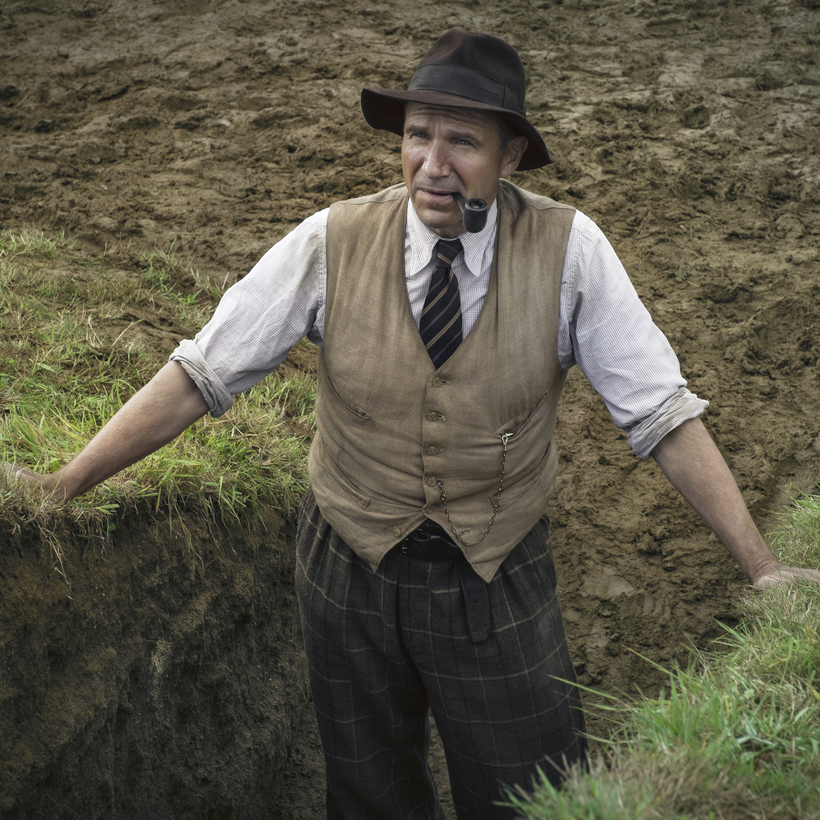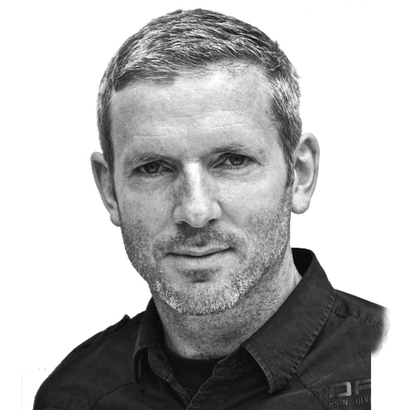Bloody Zoom. It’s such a mood killer. So blank and deadening. Not great for interviews either. That vital spark of human connection tends to dissipate down a digital feed. It does, however, have its advantages. Right now, for instance, Ralph Fiennes has nipped behind the screen to rummage around his home for a prop that he retained from his new film, The Dig. It’s a cloth cap worn by the movie’s protagonist, the archaeologist Basil Brown, who in 1939 discovered and excavated a 7th-century Anglo-Saxon burial ship at Sutton Hoo in Suffolk.
“This is Basil’s cloth cap!” the Oscar-nominated star of Schindler’s List and Harry Potter says, smiling broadly as he slips it on. Fiennes, 58, explains that Brown, a self-taught polymath and farmer’s son, was only ever pictured in one of two hats — the cloth cap and the more rakish trilby. “I haven’t got the trilby,” he adds. “But it’s the one that makes people think of Indiana Jones, which has come up a lot in conversations recently.” He means that people, like me, consistently ask him if Basil’s “look” was based on Indiana Jones.
“In fact, all of Basil’s looks were based on archival photographs,” announces the film’s director Simon Stone from the screen adjacent to Fiennes’s (so Zoom!). “So maybe George Lucas and Steven Spielberg were looking at photos of Basil Brown when they came up with Indiana Jones?”

The chat, of course, might have proceeded like this, good-natured and superficial, had we been discussing any other movie. But The Dig is special and requires a certain amount of emotional excavation. Fiennes explains that portraying Basil was a culmination of life decisions, events and career choices that move beyond mere serendipity. There are deep forces at work here.
In the film Basil is Suffolk to his bones and speaks in a strong local dialect that Fiennes, a research nut, mastered to within the nearest diphthong. “He didn’t leave character during the whole shoot, especially in terms of his accent,” Stone, 36, says. “In fact he still sends me text messages signed ‘X Basil’.” (Both men erupt with laughter.)
The dramatic dynamics in the movie are mostly felt between Basil and the terminally ill owner of the excavation site, Edith Pretty (Carey Mulligan), with whom he shares an intellectual, rather than romantic, bond. The narrative tension is created by the demands of the British Museum and its celebrated archaeologist Charles Phillips (Ken Stott), who snobbishly dismisses Brown’s work. Most importantly, the beauty of the film — the English landscape has rarely been captured on camera like this — and its obsession with the past, as the Second World War is breaking out, speaks of a desire to meet profound global change by focusing on human connection, common identity and eternal truths. It is, despite the period setting, the quintessential movie of the pandemic. “This is similar to what happened in 1939,” Stone agrees. “It’s oddly parallel. We’re not heading into any cataclysmic war, touch wood, but our lives are changing forever.”
Fiennes explains that portraying Basil was a culmination of life decisions, events and career choices that move beyond mere serendipity. There are deep forces at work here.
The return to the past began for Fiennes in September 2019, when he first acquired the “rental cottage” in Suffolk from where he is zooming. This was before he had even heard of The Dig. He was born in Ipswich and spent part of his childhood there. “Suffolk is where I go,” he says. “And I have always maintained that connection through friends of my parents.”

And so, early in 2019, when seeking a life change and “a base out of London”, Fiennes remembered the advice given to him by his fellow actor Gabriel Byrne. “He said, ‘Whenever there’s a big question for you in later life it’s very good to go home and walk the paths of your childhood.’ And that always stayed with me. And so, in my own life, I have gone back to the paths of my childhood. And there were many things I was dealing with at the time, and suddenly they all came into a different kind of focus. And then this film came along and I was asked to play Basil.”
The subsequent performance is an extraordinary cri de coeur. In 2011 Fiennes told his agent, after his long-running stint as the evil Voldemort in the Harry Potter franchise, that he would no longer be playing bad guys. With Basil Brown he has finally achieved the anti-Voldemort, creating a repository of such decency, kindness and compassion that it is at times almost overwhelming. Cue the scene where Basil comforts Edith’s crying son Robert (Archie Barnes), who has just realized that his mother is dying and he cannot save her. “We all fail, Robert, every day,” Basil says with almost indecent tenderness. “There are some things we just can’t succeed at, no matter how hard we try.” You will blub. “I can hear my mum saying similar things,” Fiennes says. “You know? ‘You learn through failure. It’s painful, but you learn.’ ”
It is, despite the period setting, the quintessential movie of the pandemic.
It helps that Basil’s relationship with Pretty is entirely platonic and free from the messy business of erotic feelings. Although there does seem to be the tiniest crackle of chemistry there, like the afterglow from an ancient, aborted romance. Was there ever a kiss, even a chaste one, in the script? “There was a kiss in a much earlier draft,” Stone admits, much to the horror of Fiennes. “I don’t remember that!” he says. “And I think I read the script earlier than Simon did, so it must’ve happened between my version and yours. I was in tears when I finished reading it because the relationship between Edith and Basil was so obviously not about that. I can’t remember a time when I’ve seen a similar relationship portrayed on film.”
Fiennes is bashful too about the accent and deflects all praise on to his 74-year-old dialect coach, Charlie Haylock, but eventually admits that during an evening drinks session in the pub he did treat his entire table to a Hamlet soliloquy delivered in peak Basil Brown. “The thing is that there was no Standard English before the 18th century,” he says. “Everyone spoke in their own accents. I had heard that from Peter Hall, who used to say [does snooty voice], ‘There was no beautiful English in Elizabethan theater!’ So, yes, out of playfulness I did [he speaks super-fast, with extra-heavy Suffolk] ‘To be or not to be that is the question whether ’tis nobler … to sleep no more.’ Yes. You could say I was showing off a bit.”

The Suffolk cottage was a godsend during the shoot (no lengthy rides to set, no early wake-ups). But how has it been during lockdown? Any close calls with Covid? How is Fiennes coping mentally with the isolation? “I’ve not had Covid,” he says. “I’m hearing from friends who’ve had it and it’s not really something you want to get. I know you can get it lightly, but having it seriously is not fun. And my mental health is such that I need to keep busy. If I don’t give myself tasks, whether it’s learning a language or doing exercise or something, I can sink into … [he trails off]. The morning time is the worst. In that weird place between sleep and wakefulness, I feel a low thing coming into me. But then I get up and start the day and I do stuff and it’s sort of OK. I live on my own and I’m happy on my own. But incrementally, over weeks and weeks, it does become a bit bizarre, a bit Twilight Zone.”
Fiennes remembered the advice given to him by his fellow actor Gabriel Byrne. “He said, ‘Whenever there’s a big question for you in later life it’s very good to go home and walk the paths of your childhood.’”
Stone (Australian but based in London) discusses his lockdown-related mental health too (he’s struggling slightly these days) and they both inquire after mine, which I say is more like Ralph’s, minus the Twilight Zone bit. I note, internally, that this is becoming, in the nicest way, like a men’s support group and so we duly plow backward into the paths of Fiennes’s childhood to find the secret driving force of one of the greatest actors of his generation — Schindler’s List, The English Patient, The Constant Gardener, A Bigger Splash. Do we need to continue?
He talks about his peripatetic years, as the eldest of six children (his siblings include the actor Joseph and filmmakers Martha and Sophie), bouncing from Suffolk to Salisbury to Ireland and back again with his photographer father, Mark, and writer mother, Jennifer Lash. I thought that maybe the constant location-hopping might have influenced his shape-shifting abilities, but, bar a certain confident strut he claims to have gained from his four bohemian years in the west of Ireland (from 1973 to 1977, lots of home-schooling and limitless freedoms), he says that the acting ultimately came from parental influence and his formative foundation course at Chelsea School of Art. The course, he says, woke him up creatively and allowed him to “reclaim memories” of school plays and listening to his mother’s Shakespeare recordings and enjoying at home with the Fiennes family “sophisticated versions of charades involving extremely complex improvisations!” He hoots with self-deprecating laughter. And so, one day in Chelsea, he said: “‘Ah f*** it! I love Shakespeare and I want to say his words.’ And I went home and said to my mother, ‘I want to try and be an actor.’ And she just said, ‘OK. Go be an actor. Do it!’”
And the rest is Rada, the RSC and some high points in screen history. His marriage to fellow Rada student Alex Kingston imploded in 1997 after Fiennes’s affair with Francesca Annis, 17 years his senior and then playing his mother onstage in Hamlet. Their relationship continued until 2006 and since then, but for a widely publicized encounter with an air stewardess on a Qantas flight in 2007, Fiennes’s private life has remained both out of bounds and the least interesting thing about him.

He’s next up in the new Bond installment No Time to Die, reprising his role as MI6 boss Gareth Mallory, aka M. Although after missing two previous release dates (April 2020 and November 2020) due to lockdown, and with the new April 2 slot looking highly unlikely, does he think that Bond, like other studio blockbusters (Wonder Woman 84) will end up online? “I want to be optimistic and hope that they hold their nerve,” he says. “As a punter I would love to go and sit and watch a big movie in the cinema. I feel a real hunger to be in a cinema, so I hope they hold their nerve.”
And as for his future, post-Bond projects? None. Absolutely none. Really? “About three months ago I knew what I was doing, but then everything that was slated got moved around,” he says, before trying to look on the sunny side. “Look, for so long I used to say, ‘I want a sabbatical.’ ” He pauses, looks around the interior of his relatively new Suffolk cottage hideaway, the end point of childhood paths, and he starts to chuckle wryly. “And now I’ve got one.”
Kevin Maher is an Irish writer and critic. He is the author of The Fields and Last Night on Earth
The Dig is on Netflix

